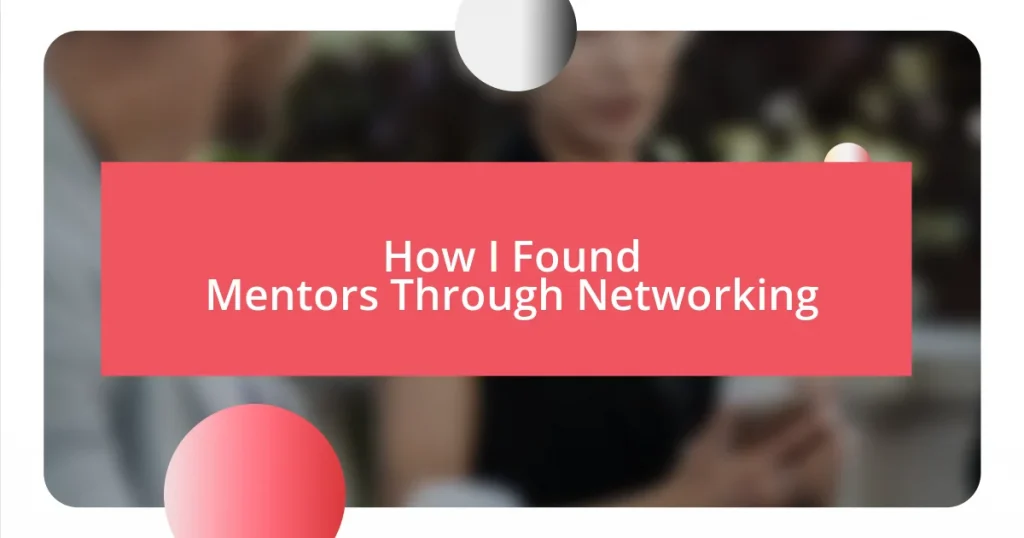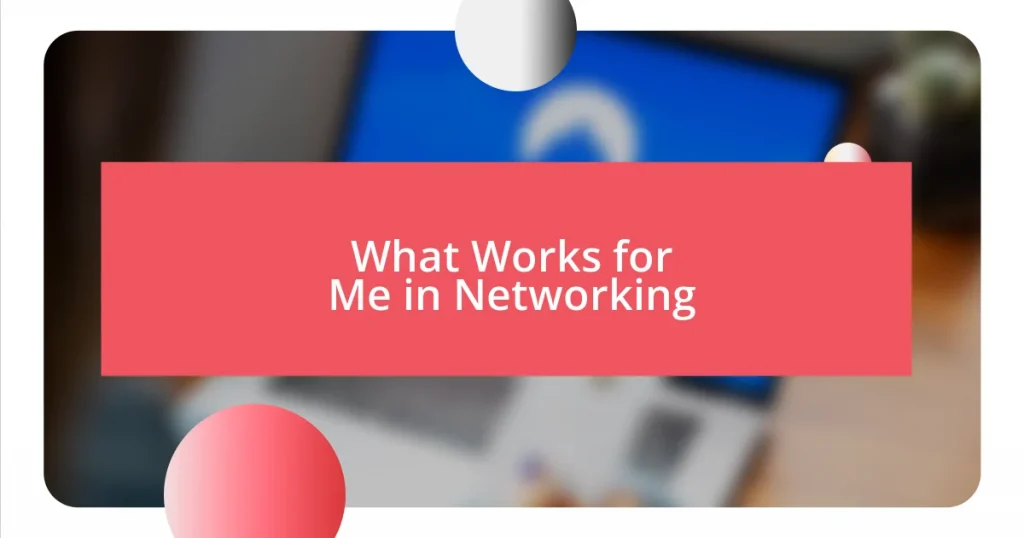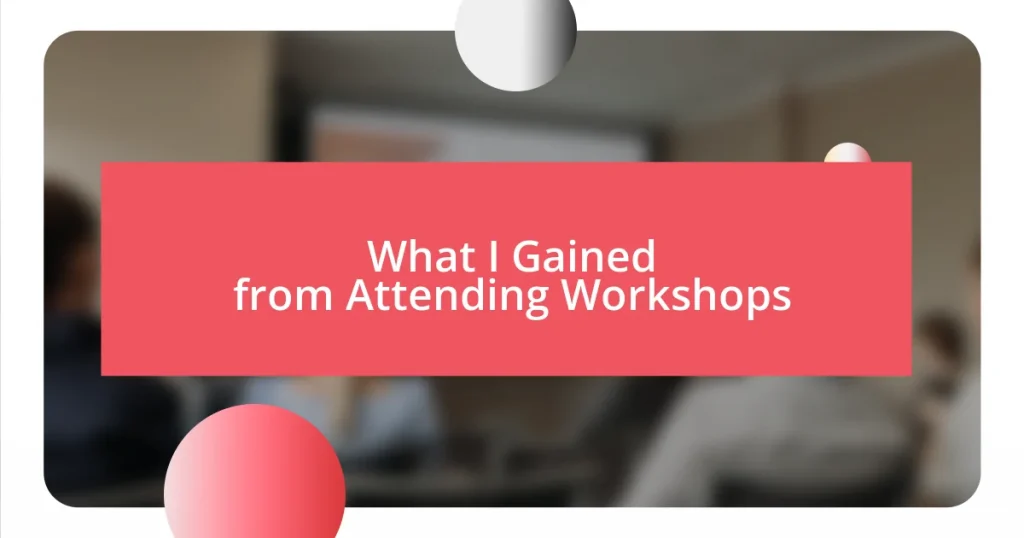Key takeaways:
- Mentors provide invaluable support and resources that can significantly shape your career and personal growth.
- Identifying your specific mentorship needs—whether technical skills, emotional support, or career guidance—enhances the effectiveness of your mentorship relationships.
- Building and maintaining genuine connections through consistent communication and appreciation is essential for nurturing successful mentor-mentee relationships.
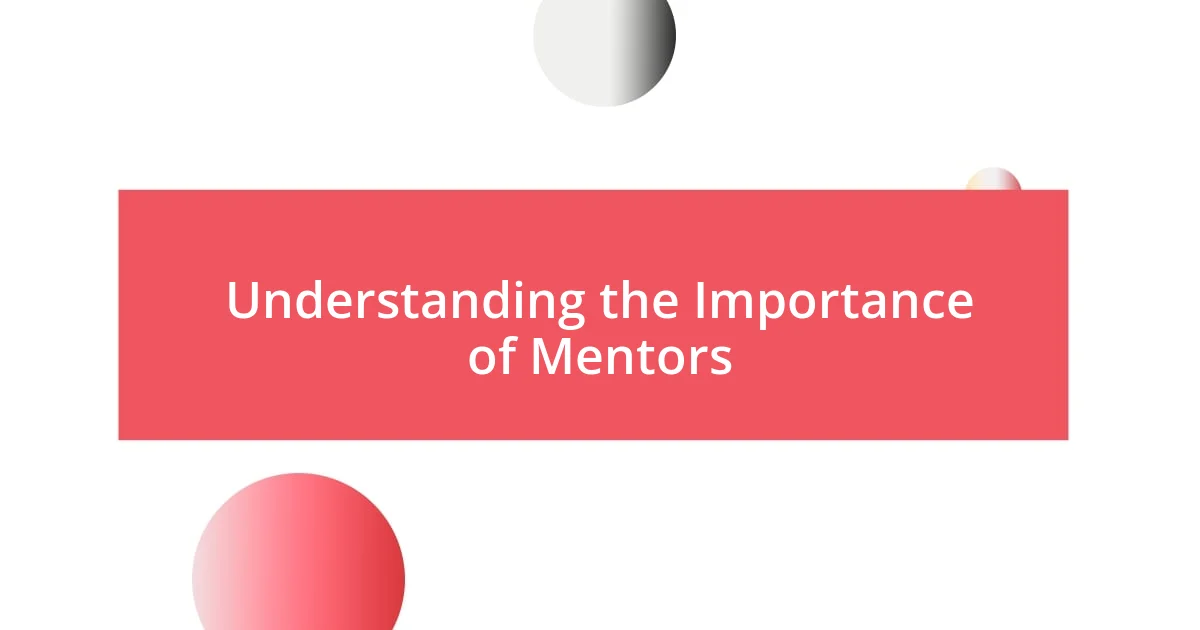
Understanding the Importance of Mentors
Mentors play a vital role in shaping our careers and personal growth, often offering wisdom that we simply can’t find in textbooks. I remember my first mentor, who patiently guided me through the complexities of my industry, showing me that practical experience is just as valuable as theoretical knowledge. Have you ever encountered someone whose insights made a light bulb go off in your head? That’s the power of mentorship.
Consider this: a mentor often acts as a sounding board, helping you navigate challenges and make informed decisions. When I faced a major career crossroads, my mentor’s perspective saved me from making a hasty choice that could have set me back years. Doesn’t it feel incredible to have someone in your corner who believes in your potential and can instill confidence in your abilities?
Having a mentor can accelerate your learning curve, providing you with unique opportunities and connections. I learned that through my mentor’s extensive network, I was able to connect with influential people in my field, opening doors I never thought possible. How would your career change if you had someone guiding you, sharing their contacts, and offering insights from their own experiences?
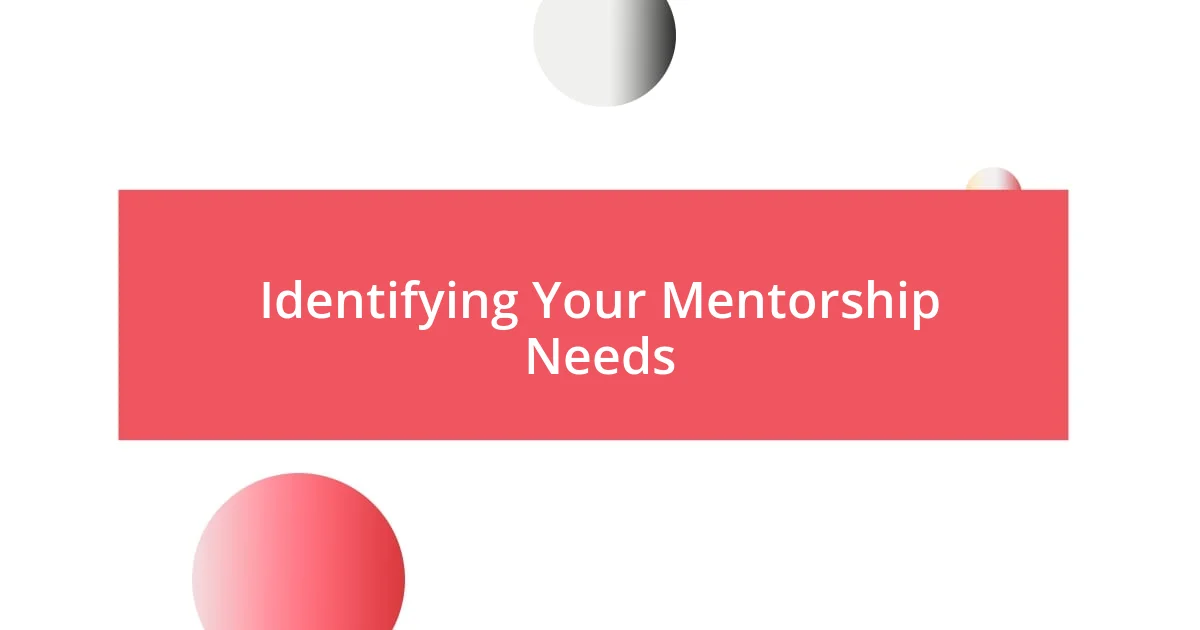
Identifying Your Mentorship Needs
Identifying what I truly need from a mentor is often more challenging than it seems. I used to think I needed guidance solely in technical skills, but over time, I realized that personal development and emotional support were just as important. Have you ever felt overwhelmed by your aspirations? Sometimes, just having someone to talk to about those feelings can clarify your path.
I recommend taking the time to reflect on your goals and challenges. When I began my professional journey, I wrote down the specific areas where I felt lost, and that practice really illuminated my needs. It was like having a map for my mentorship journey. What do you think would happen if you mapped out your career aspirations alongside potential mentorship needs?
To illustrate the importance of understanding your mentorship needs, consider how different types of mentors can serve distinct purposes. For example, I once worked with a mentor who specialized in leadership development, which helped me grow my soft skills. Conversely, another mentor offered technical expertise, significantly improving my work quality. It’s fascinating how the right mentorship, tailored to your specific needs, can create exponential growth.
| Type of Mentor | Focus Area |
|---|---|
| Leadership Mentor | Soft Skills Development |
| Technical Mentor | Industry-Specific Knowledge |
| Career Coach | Career Guidance and Strategy |
| Network Mentor | Connections and Opportunities |
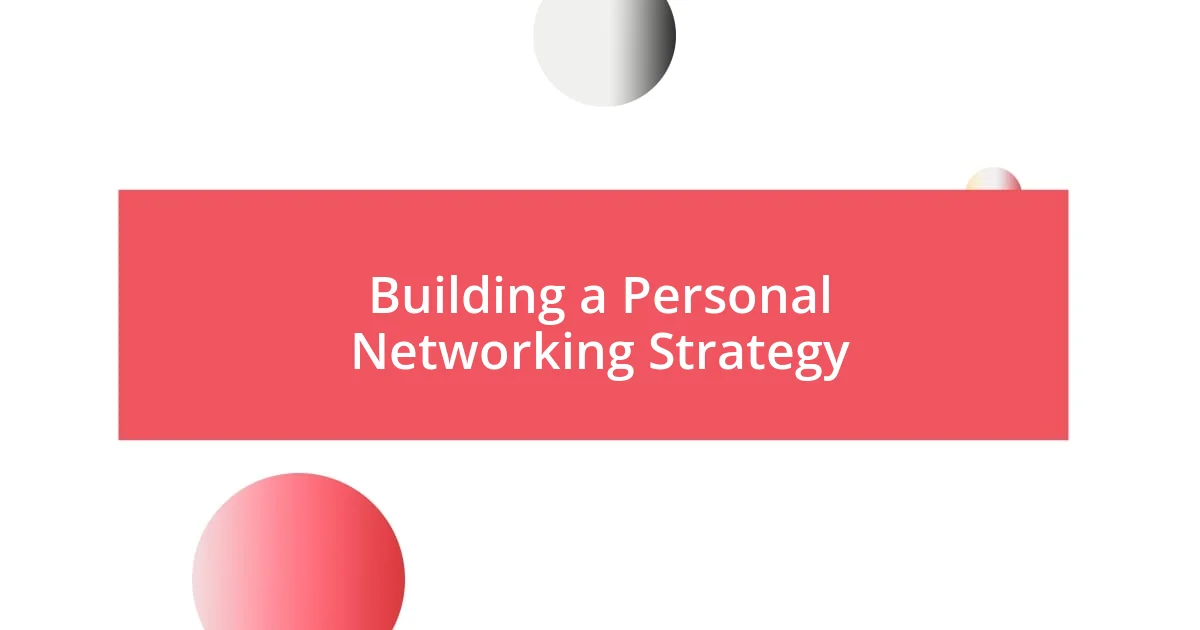
Building a Personal Networking Strategy
Building a personal networking strategy is both an art and a science. I discovered early on that it isn’t just about meeting people; it’s about cultivating meaningful relationships. In my own journey, I realized that each connection was like a seed—some would flourish into mentors, while others might remain casual acquaintances. The key is to be intentional. I often ask myself, “What am I hoping to gain from this interaction?” This mindset has fundamentally shifted how I approach networking.
Here are some essential steps to build an effective personal networking strategy:
- Define Your Goals: Know what you want from your networking efforts—be it guidance, opportunities, or support.
- Identify Key People: Look for individuals who align with your aspirations or possess expertise you admire.
- Engage Authentically: Reach out with genuine interest; people appreciate sincerity over transactional interactions.
- Follow-Up: Maintain the connection by checking in or sharing relevant articles that may interest them.
- Offer Value: Think about how you can contribute to their journey, even in small ways, to foster reciprocity.
These elements have transformed my networking approach. When I was seeking guidance for a specific project, I reached out to someone I had met at a conference months earlier. I was nervous, but when I expressed my genuine curiosity about their work and shared my struggles, they responded positively. That conversation blossomed into a mentorship that guided me through a challenging phase, proving how thoughtful engagement can yield rich rewards. It’s truly fascinating how these deliberate efforts can build a support system that feels both empowering and nurturing.
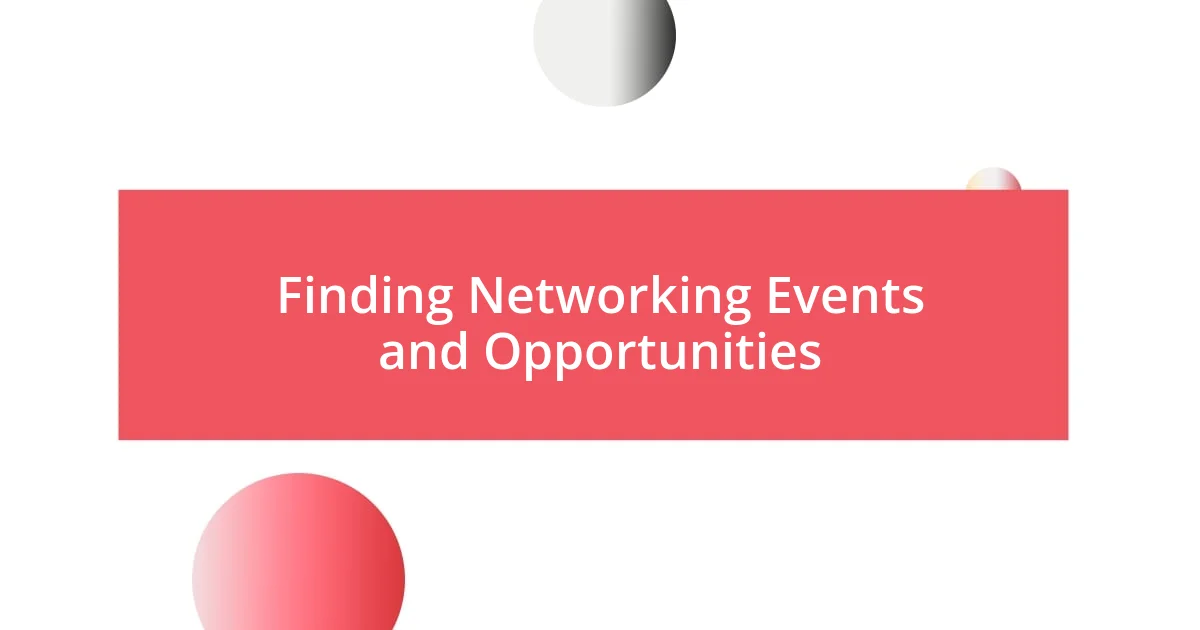
Finding Networking Events and Opportunities
Finding networking events can sometimes feel like searching for a needle in a haystack. I remember scouring local event listings and social media platforms just to find gatherings relevant to my field. It was eye-opening to discover that many industries have dedicated websites or groups where events are listed. Have you ever explored community boards or meetup groups in your area? In my experience, these are gold mines for connecting with like-minded professionals.
Once I attended a workshop hosted by a local organization, and it changed everything for me. Meeting individuals who were on similar journeys made me realize the power of shared experiences. That day, I not only learned valuable skills but also left with a couple of new contacts who became mentors. The energy in the room was infectious! Finding the right opportunities often hinges on being open and putting yourself out there, even when it feels daunting.
I also suggest keeping an eye on industry conferences and webinars that often offer networking sessions. They create a perfect setting to mingle with experts and fellow attendees. I vividly remember a virtual summit I attended, which led to my first mentor relationship. I made a point to reach out to a speaker afterward and expressed my admiration for their insights. That simple message turned into a series of conversations that helped shape my career path. It makes me wonder—how much closer could you get to finding your ideal mentor just by participating in such events?
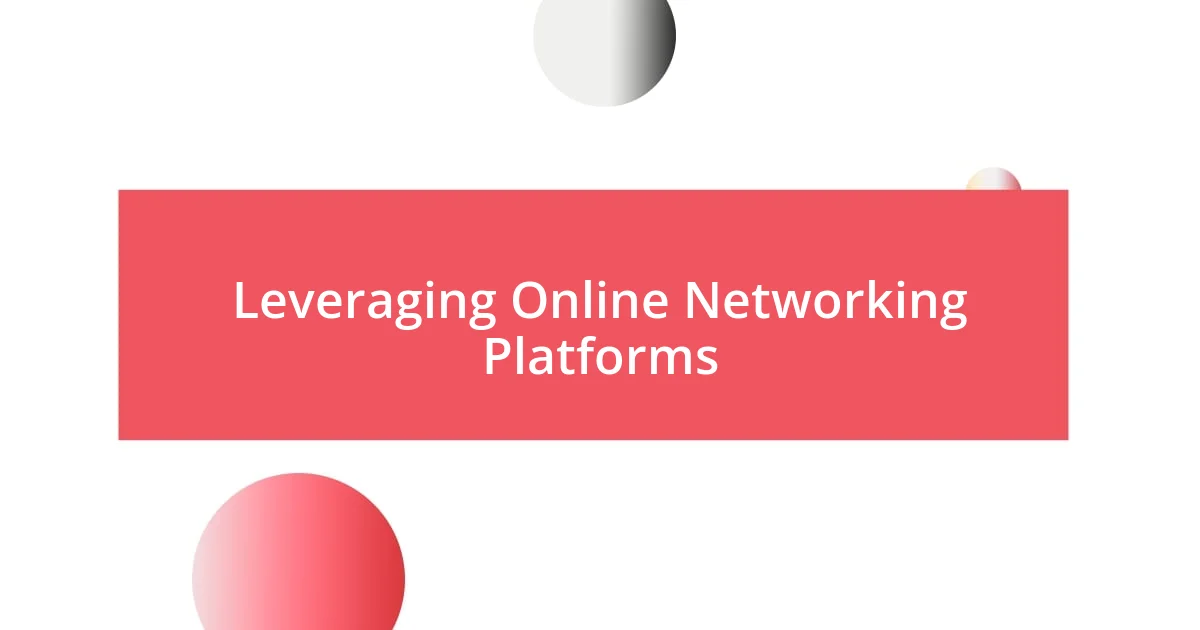
Leveraging Online Networking Platforms
When I first started exploring online networking platforms, I was amazed at how much they could enhance my connections. LinkedIn, for instance, became a crucial tool for me. I remember reaching out to a professional who had posted insights aligned with my interests. I took the time to comment thoughtfully on their posts, which eventually led to a direct message conversation. This engagement felt more personal than just sending a generic connection request; it was about building a rapport based on shared interests. Have you leveraged social media in this way? I find that meaningful engagement often opens doors that a simple “let’s connect” never could.
Moreover, I’ve discovered that online communities, such as niche forums and Facebook groups, can also be invaluable. One time, a question I posted in a specialized group regarding career development caught the attention of an experienced mentor. They not only answered my inquiry but encouraged a deeper conversation. This interaction led to weekly check-ins where I gained insights I would have never acquired otherwise. It was a game-changer. Isn’t it fascinating how a single question can lead to significant growth? The internet truly expands your reach beyond geographical limits, offering a treasure trove of mentorship opportunities.
As I explored different platforms, I learned the importance of consistency and presence. I made it a habit to share my experiences and insights regularly on Twitter. I vividly recall a time when I tweeted about a challenge I faced in my career. A mentor reached out, sharing their own story and offering advice. It made me realize that vulnerability can invite support in unexpected ways. What if by simply sharing your journey, you attracted mentors who resonate with your path? The beauty of online networking is not just in the connections made, but in the conversations sparked and the community built around shared experiences.
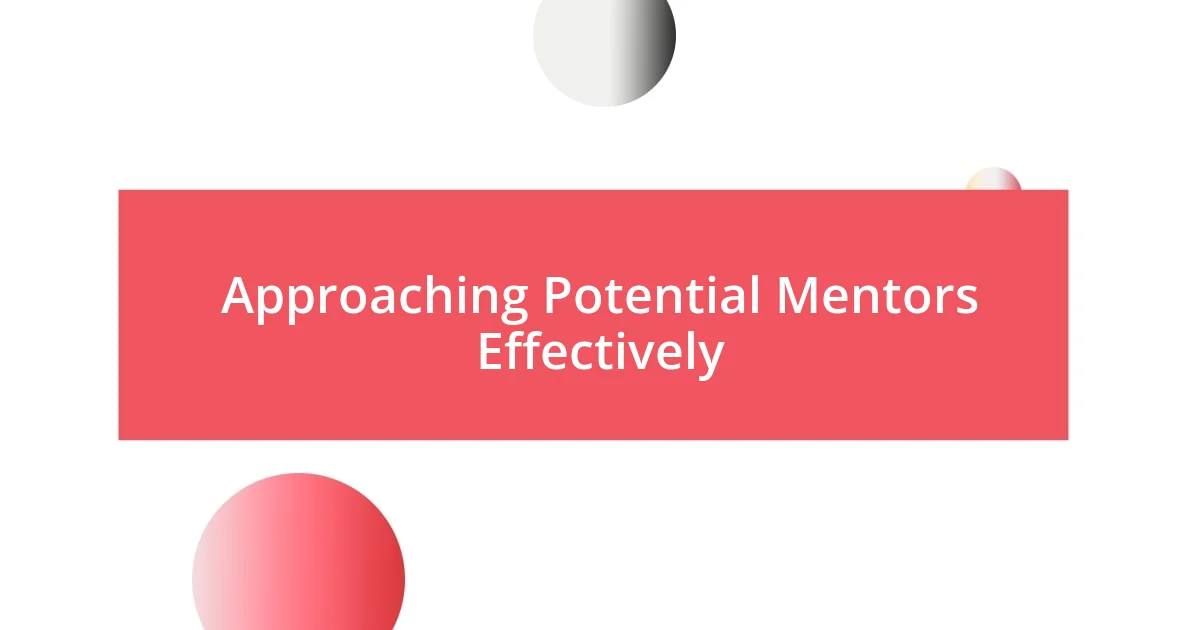
Approaching Potential Mentors Effectively
Reaching out to potential mentors can be daunting, but I’ve found that a warm and genuine approach works wonders. For example, when I was seeking guidance from a senior colleague, I crafted my message carefully. Instead of a generic “Can you be my mentor?” I shared a specific project I admired that they had completed, along with a poignant question about their process. That personal touch opened the door to a conversation that blossomed into a mentorship. Wouldn’t you agree that a thoughtful message stands out much more than the usual ones?
Timing is also everything when approaching a potential mentor. I recall attending an industry talk where one of my idols spoke about their career path. Shortly after their presentation, I seized the moment to introduce myself and express how their journey resonated with my aspirations. That brief interaction led to a coffee meeting later, where they generously offered advice on navigating early career challenges. Have you ever thought about the magic that can happen when you engage during the right moment? It’s a strategy that has paid off for me multiple times.
Lastly, I emphasize the importance of following up after that initial contact. When I connected with a mentor through a networking event, I made it a point to express my appreciation for their insights just a day later. This small gesture not only solidified our connection but also showcased my eagerness to learn. How often do we forget to nurture these budding relationships? For me, it’s crucial to show that I value their time and wisdom, creating a foundation for a more meaningful mentorship.
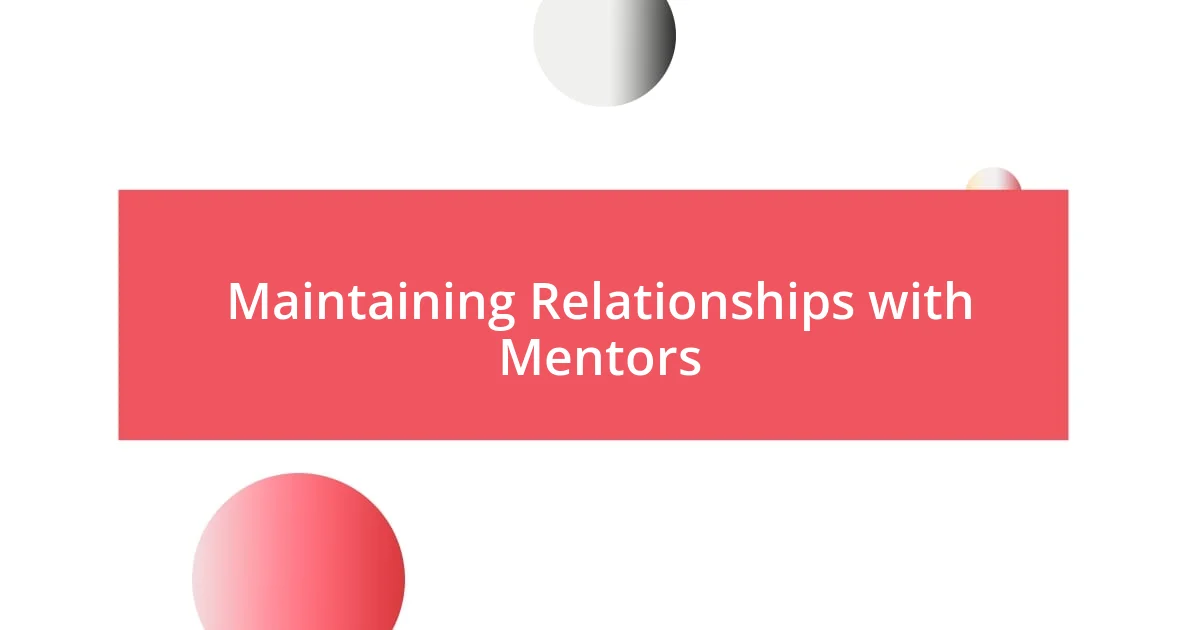
Maintaining Relationships with Mentors
When it comes to maintaining relationships with mentors, consistency is key. I remember a time when I placed a high value on staying in touch with a mentor who had an enormous impact on my career trajectory. Every few months, I would send a short email updating them on my progress and asking for their thoughts on specific challenges I was facing. This not only demonstrated my respect for their input but also kept our connection strong. Have you ever considered how even a simple check-in can reignite a dormant relationship?
Another critical aspect is showing genuine appreciation for their guidance. I still recall a lunch I had with a mentor who helped me navigate a tough decision. Afterward, I took the time to send a handwritten thank-you note—something I believe is increasingly rare. It felt good, and it meant a lot to them to know their advice was valued. When was the last time you expressed gratitude to someone who helped shape your path? Small gestures like this can deepen your bond and encourage mentors to continue supporting you.
Lastly, I’ve found that mutual engagement enriches the mentor-mentee relationship. I once asked a mentor about their current projects and offered to help where I could. Not only did this open the door for collaboration, but it showcased my willingness to contribute to their success as well. Isn’t it interesting how relationships flourish when both parties invest in each other’s journeys? This two-way street creates a powerful dynamic that can lead to lasting partnerships.










